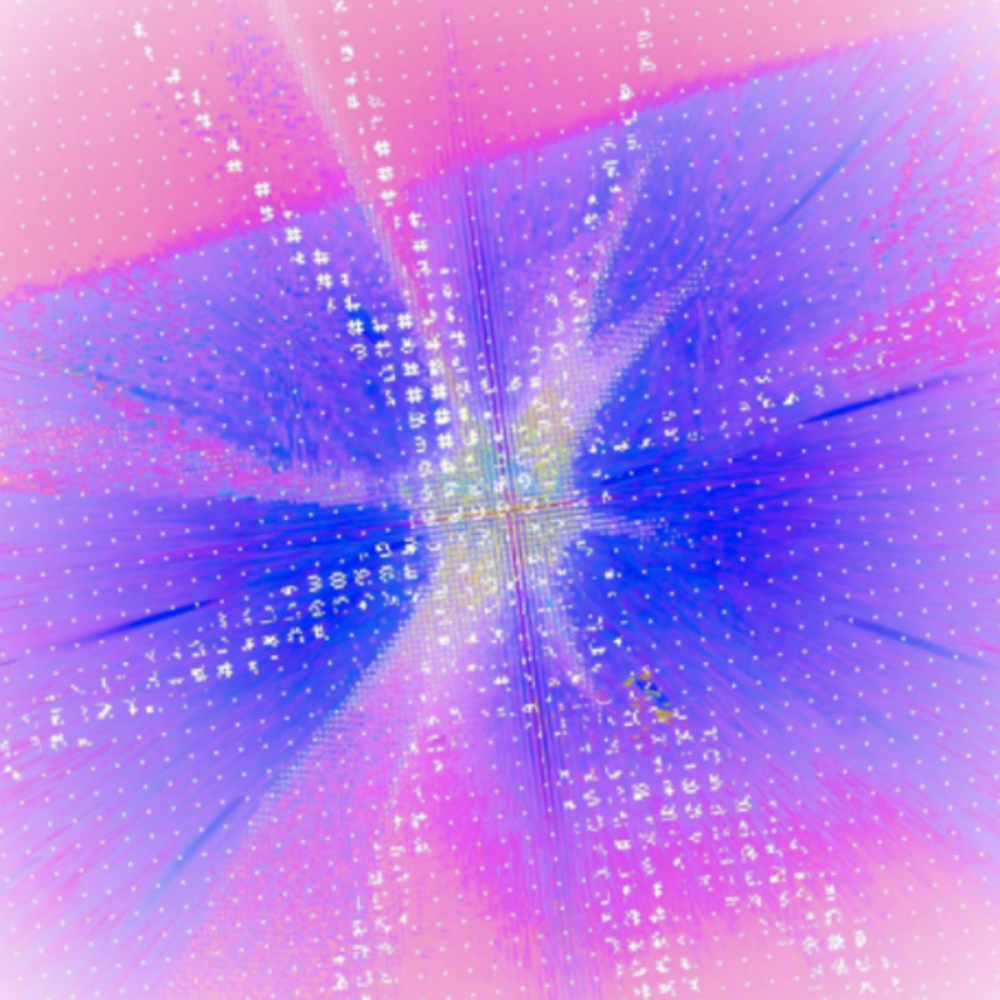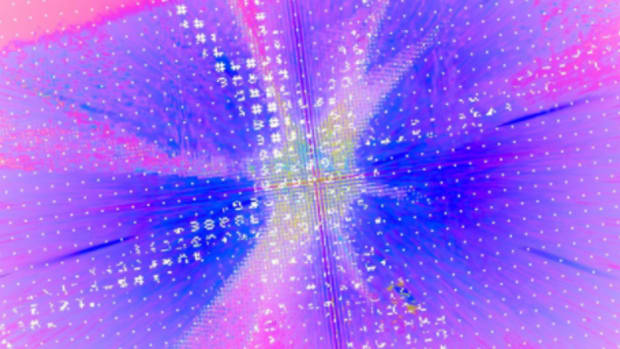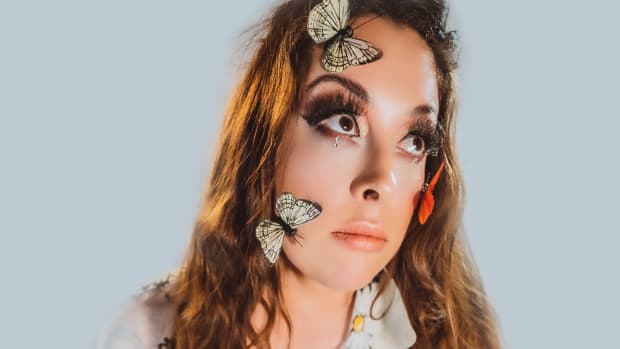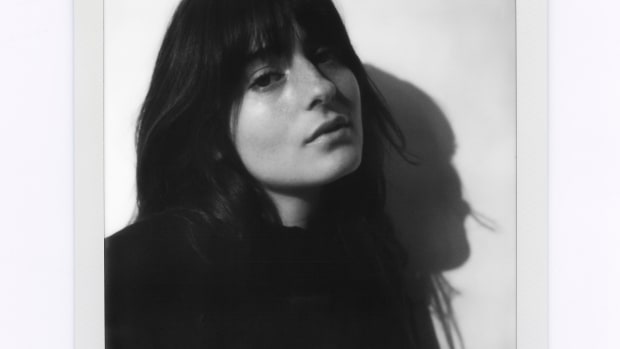
If you're late to the party, welcome to the world of Live Coding!
DJ_Dave is one of the premiere artists coming from the Live Coding world; one composed of experimenters, teachers, enthusiasts, and with the highest honors intended, nerds. DJ_Dave got her start through a happy accident when she stumbled on a class in college that advertised "Coding + Music = Algorave."
She took a chance on it, as it sounded pretty cool, and fell in love nearly immediately.
Fast forward a little to COVID lockdown, DJ_Dave dove headfirst into honing her expertise in Sonic Pi, building her performance chops at Algoraves, and preparing herself to take music seriously as a career.
And now what is she up to?
She's flying all around the country to open for eye-popping DJs and musicians, and playing private parties for people you wouldn't believe.
We dive into her journey into DJ_Dave's journey into Live Coding, and the Algorave world as a whole, in the interview below. Ahead of that interview we've got her brand new single "Castles," in all its lushy goodness. But first, let's dip our own toes in a little. What exactly is "Live Coding" and how does it work?
Live Coding is the use of software development approach in the pursuit of producing music. For some context, 97% of the new electronic music you hear out there is produced using a few select Digital Audio Workstations (aka DAWs): Ableton, Logic, maybe some Fruity Loops. The power of these DAWs is that you can use the extraordinarily complex user interface to get extremely granular in how the sounds are morphed and edited.
How does this compare the Live Coding? Well if you think of starting a new song from scratch using one of the above DAWs, it's fairly accurate to think of it as a wide open canvas. For Live Coding, though, the accurate way to think about it is to consider a new song as being a lined piece of notebook paper.
Instead of dropping in sounds in the x and y space of a canvas, you are leveraging tools like Sonic Pi and Tydal Cycles to use word and phrases to conjure sounds up nearly out of thin air, as if you were describing a brand new song in a brand new Google doc.
It's like the similarities and differences between flying and swimming.
The uniqueness and amazement that comes with attending a Live Coding event is that, as if by unalienable edict, every event has the laptop screen of the live coder projected onto a screen behind them. So, as if watching someone composing a live sonnet, you are seeing a real life human summon a song.
You can see in real time as they're editing their work, and you hear scant moments later exactly what they did. As the audience members watch, dancing while simultaneously trying to follow what the live coder is doing, its head and heart together as one.
Before we get into DJ_Dave's interview, let's get some context on how her new singles "Castles" came together, in a way so very tied to her love of Live Coded music. Here's the link tree to find it on your preferred source. Take particular notice of the video below, which includes the live coded visuals akin to what you would see at an Algorave in person!
Right when I took the Sonic Pi class, I got a folder of royalty-free samples. I went through some royalty-free website and found a bunch that I thought could be cool one day and proceeded to completely forgot about them, which ended up being perfect.
So, whenever I'm on the plane, I get really locked into making stuff. But, it's also funny, because I can't access the internet, so I'm off the grid just working.
There is this one file, a female chorus, that I thought was really cool. I had no idea what to do for BPM so I just picked 130, threw a kick on it and a side chain on the sample. It sounded awesome! So then I just went for it and made the whole song on the plane. The whole structure of the song came together on my five hour flight home from LA.
Eugene: How did you discover Sonic Pi? Was it the tool they picked in your Live Coding class?
DJ_Dave: It was! It was the only tool they taught us in the class. One of the reasons why it’s so popular is because it’s free and easy for people to download. It’s compatible with most computers.
And, importantly, it's a much lighter lift than, let’s say, TidalCycles, which crashes everyone’s computers all the time. Sonic Pi has never crashed my computer once!
Eugene: Can you walk me through the stages you progressed through when you went from initial exposure to sonic pi through until you had enough expertise and confidence to perform live?
DJ_Dave: The whole semester was preparing us to be able to do a live performance. so the curriculum was, obviously at first, learning how to use Sonic Pi, learning the basics, and then we each developed our own niche interests. Mine was sample manipulation and building out song structures.
My approach was that I learned how to use the Live Coding environment, but I was interested in learning how to take this limited knowledge and make the best music I could.
Eugene: So, and when you first started doing sample manipulation, did you pick artists that you liked, songs that you liked, in a pursuit to emulate those? Or, to use those and make something that sounded different?
DJ_Dave: Well first off, I was really not planning on doing this as a career. I was really just fucking around with it. I thought it was cool and I liked the structure of live coding, but I had no connections to the music industry, or even with other musicians and their process.
But I had a few friends who were singers, so I asked them to send me some acappellas.
My favorite thing about the three people I asked for acappellas from was that their style was really very different from mine. None of them were dancey at all, so I was inspired by working with stems from an artist who is completely different from me. It felt like having a blank slate.
Now I work with artists who are a lot more along the same genre lines as me, but my initial inspiration came from throwing myself off the deep end and being like, "What are you going to make with this?" On paper, it doesn't seem helpful, but it actually ended up leading me to some of my best work.

Listen to DJ_Dave's latest single"Castles," and learn the ethos of Algorave

VNSSA Drops 'Music4TheMasses' On Diplo's Higher Ground Imprint

Weedsday Playlist: Romy Reiner Shares 5 Songs for Your Next Smoke Sesh
Eugene: Okay. So, once you started learning and loving Sonic Pi, how did you start to interact with the Algorave, or the live community, at large, outside of the class that you were in?
DJ_Dave:
So, I knew that it existed. I knew that there were other people doing it, but I didn't know how prominent the live code community is in New York.
But when I started to take my music career a little more seriously, my current VJ, Char, reached out to me. I'd literally never met her, didn't know who she was at all. She reached out and was like, "Hey, I'm from LiveCode.NYC We're this Algorave community, would you want to perform at this show?" I couldn’t believe they were asking me to play.
I performed at the venue, Wonderville, and everyone was super fucking cool. So I played a few more after that, and next thing you know, I’m in the live code community. It was just that easy! Everyone is super accepting and super knowledgeable.
Also, many of them have teaching experience. I’d be like “Oh my god, you guys are so smart, I wish I knew how to do this.” Their responses would be like “We’ll teach you any time you want, give me call. I’m always free.” The community is just so nice like that!
Eugene: Is the community as a whole so willing to invite new people to perform?
DJ_Dave: Yeah definitely. It might be in the Algorave manifesto, or it might just be a general community rule, but when putting on live shows, you’re not allowed to exclude anyone at all. Literally anyone who wants to perform gets to perform. Regardless of their experience level, regardless of the type of music they make, or the equipment they use.
Even if you didn’t have a laptop, if you knew how to use a program and one of the other coders had it on their machine they’d set you up so you could try out performing live. We’d push people up on stage like “get up there, get up there!” It makes it such an accepting open community for people to feel comfortable stepping into. It’s crazy too, these people are geniuses!
Eugene: How would you rate your technical skill level?
DJ_Dave: That's been something that stresses me out because my understanding of all this tech stuff is pretty limited, because I feel like I'm more of a creative than I am a software engineer. There are so many people who can expand their creative vision, and because they have the skills, they have the means to execute on that vision.
I feel sometimes my ideas stop at the idea stage, because of my limited technical skills. But the good thing is that I feel like I'm building a big enough community of people who can help me at this point.
Eugene: How does performing using Live Coding differ from a traditional DJ set?
DJ_Dave: It's weird because Live Coding is such a geometric way of performing. There isn’t a lot of room to be expressive or let your movements inform your output in any way. I’ve found that when I’m most lost in what I’m doing, I’m the least outwardly expressive. It’s like I’m inside the computer; so in tune with it, and the process’ little intricacies.
Eugene: What is the process required for you to learn your code such that you can reach a creative flow state while performing live?
DJ_Dave: I like to say that my live coding practice is really focused on the output rather than the process. There are a lot of live coders who feel that the way they write code is very much part of their artistic process. I want to make music that I would listen to, even if it weren’t live coded, but perform it with code.
To do that, I have to be very precise about how I perform it. Some of my songs I’ve been performing for two years or more and I certainly have ones that I like performing more than others.
Eugene: Why does performing one song work better for you?
DJ_Dave:
There are some that I just really like the flow of, and I like how I wrote the code for. There are also some songs that I've been playing for so long, and I know them so well, that I have more complicated things I can do while performing. For instance, in one of my songs, there’s a high pass filter that builds over time. As far as I know, there isn’t a way for it to build towards the top and stay there. So I have to track it as it’s happening and, at the right moment, stop it from building while I simultaneously mute the rest of the audio. Those are the things that I have to keep track of in the songs I play; I have to be very attentive and get the timing right. For some reason, I really like that part!
Eugene: What do you think works so well about live coding/Algorave events for the audience members? Why do you think it is so interesting and fun?
DJ_Dave: For me, as someone who knows what's going on, who has a pretty deep understanding of how the performance works, it's just literally amazing to see what other people can do with it. I also remember having a similar kind of feeling when I didn't know it that well, too, though. Because you can see what they’re doing on screen, it's like you're watching someone play an instrument.
They’re literally creating the sound as you watch. I think it’s a very interesting experience to watch someone manipulate code in that way live. There’s a constant feeling like: "What's going to come next? Do they know what's going to come next? Do I know what's going to come next?" It’s really an audience experience like no other.
Eugene: Where would you like to see the live coding scene be in one year and then five years to 10 years?
DJ_Dave:
As soon as I saw it, I knew it needed to be on the big stage, at a big festival. So I want a big audience with big production values. It's just such a crazy way of performing! I thought it was going to take a few years, but this June I'm performing at Electric Forest!
But in general, for the scene, I want to see this level of attention happen more often, and to other artists. I don't want to be the only live coder that gets attention, because there are so, so many other ones that are extremely talented. In so many different genres, incorporating all different kinds of other elements into their practice. I want this scene to expand into and be accepted by the music industry.
I also would like to see it grow into things that are really community focused. Whether that's high level, like an Algorave festival, or just developing resources to get this education out to more people, especially people that don't have access to it. I think live coding is such a particularly special skill because it involves so many different things that are so helpful in life. It's a form of creative expression. It's a very solid skillset to know how to code. It's a way of performing. It's a way of teaching. A way of learning both math and music!





